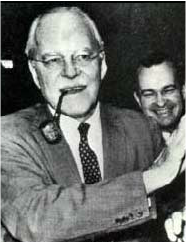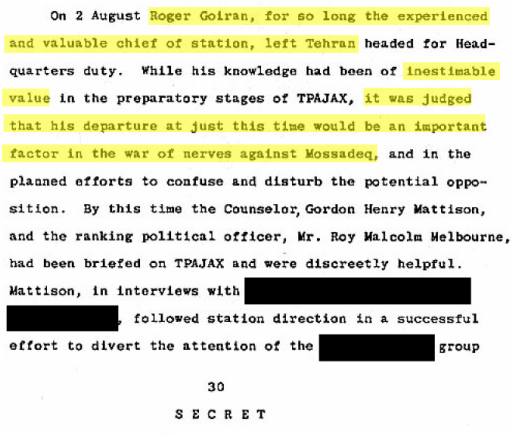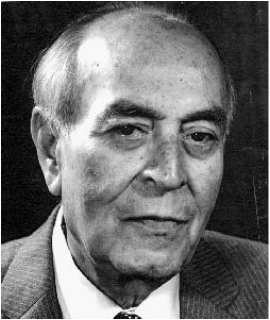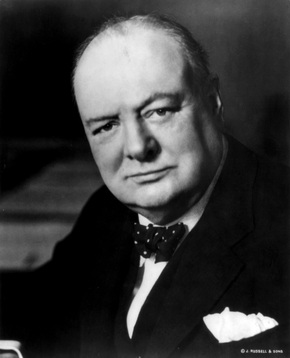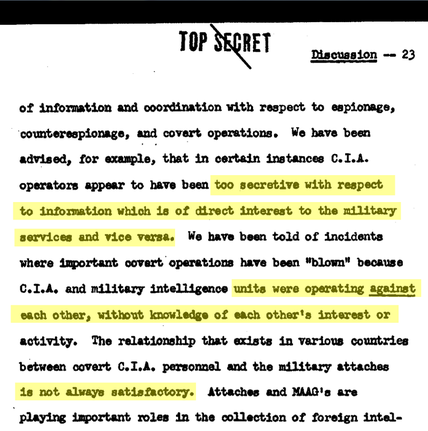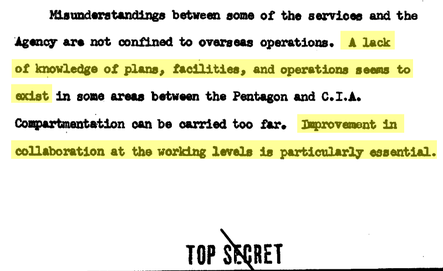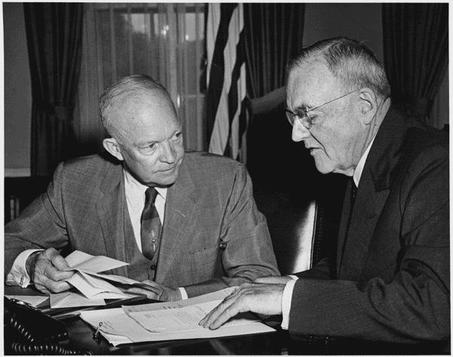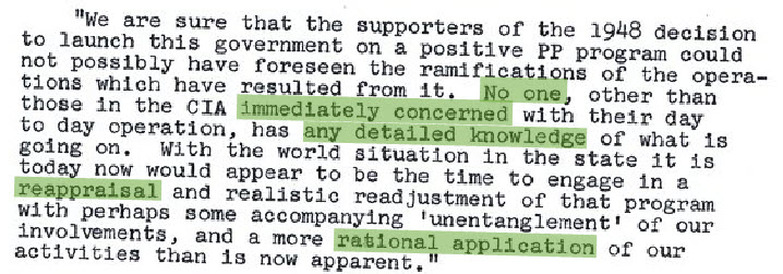Information and Communication
As a result of willful blindness, the Dulles brothers ignored vital information and failed to communicate effectively with their peers and subordinates, preventing them from making prudent decisions.
Willful Blindness
As a result of their stubborn views, the brothers chose to ignore many opposing opinions or facts that contradicted their beliefs.
"Nor do I think that Foster Dulles gave the plan anything like the detailed, even loving, scrutiny that his British opposite number undertook."
-Kermit Roosevelt
|
"The CIA station chief in the years before the coup, Roger Goiran, was replaced...this occurred because Goiran opposed the coup."
-Mark Gasiorowski, Tulane University |
Excerpt from the Wilber Report relating to Roger Goiran's dismissal. Click here for the relevant section from the document.
|
"[John Foster Dulles handled] discrepant information [by] discrediting the source of the new information; reinterpreting the new information so as to be consistent with his belief system; or searching for other information consistent with preexisting attitudes."
- Ole Holsti, Duke University
Fear of Communism and British Influence
Despite evidence to the contrary, the Dulles brothers were extremely wary of the communist Tudeh Party in Iran, which led to their presumptuous and stubborn decision to instigate the coup. The British used this fact as leverage to recruit the United States in their coup effort.
"We have enemies who are plotting our destruction. And any American who is unaware of this is like a soldier asleep at his post."
-John Foster Dulles during a radio address, 1953
-John Foster Dulles during a radio address, 1953
"Stalin’s aims in relation to [Iran] were limited and secondary to more important goals in Europe."
- Geoffrey Roberts, Journal of Contemporary History
- Geoffrey Roberts, Journal of Contemporary History
The Dulles brothers were misled by the British, who were financially motivated
to gain United States assistance in the coup.
to gain United States assistance in the coup.
|
Dr. Moyara Ruehsen on British motivations
during the coup "When the British told him that Mossadegh was leading Iran toward Communism—a wild distortion, since Mossadegh despised Marxist ideas—Dulles and Eisenhower agreed to send the CIA into action." |
|
Iranian journalist Fariba Amini on British influence and Mossadeq's relationship with the Soviet Union
|
Failures in Collaboration
Collaboration in the CIA both internally and inter-departmentally with other organizations in the Eisenhower administration was flawed and fraught with misunderstanding.
"I don't know what to make of [a State Dept. report stating lack of Communist threat in Iran]. Loy Henderson [US ambassador to Iran in 1953] thought that there was a serious danger that Mossadegh was going to, in effect, place Iran under Soviet domination."
-Kermit Roosevelt
|
Excerpts from The Report on the Covert Activities of the Central Intelligence Agency, also known as the Doolittle Report. Click here to view the full report.
|
Excerpt from the Bruce-Lovett Report to the CIA, 1956. Click here to view the full report.
Dominating Leadership
Due to the Dulles brothers' absolute and stubbornly arrogant views, their subordinates were hesitant to voice their concerns. The concerns of those that did vocalize were often overlooked.
|
Professor Mark Gasiorowski on subordinates' unwillingness to voice opposition
"I was morally certain that almost half of those present [at the secret Operation AJAX planning meeting], if they had felt free or had the courage to speak, would have opposed the undertaking." |
